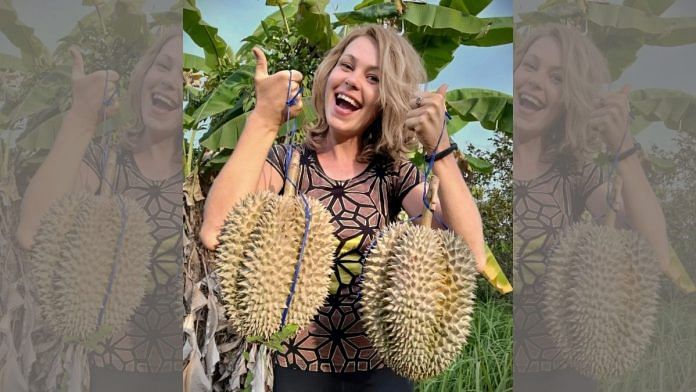New Delhi: With a growing obsession around healthy eating, fad diets and advice are everywhere on Instagram. One such dietary pattern was promoted by Russian influencer Zhannah Samsonova — an exclusive diet of raw tropical fruits and nothing else. But this 39-year-old’s tragic death in Malaysia recently has now raised concerns about extreme nutritional choices.
Many experts have cautioned against such cookie-cutter diets and one-size-fits-all meal plans. Speaking to ThePrint, Kerala-based gastroenterologist Dr Rajeev Jayadevan said a good diet should compose a plate full of proteins, carbohydrates and balanced amounts of fruits as well as vegetables.
Samsonova, who went by the name ‘Zhanna D’Art’ online, reportedly died of “starvation” after living on an “only-fruits diet” for over a decade. The influencer, with over 18,000 followers on Instagram, claimed she only ate fruit juices and smoothies, jackfruits, durians, seeds and sprouts for her meals. She also shared recipes on her Instagram account.
The vegan influencer, who also claimed to be a mono fruitarian (one who eats meals consisting of only one food, usually raw fruits or vegetables), breathed her last during a tour to Southeast Asia. According to reports, Samsonova’s friends had noticed her “swollen legs and oozing lymphs” prior to her death.
The deceased’s mother, Vechernyaya Kazan, claimed that her daughter died of a “cholera like infection” which was triggered due to exhaustion and malnutrition. Kazan also attributed Samsonova’s condition to her extreme vegan diet, saying she disapproved of it.
“In veganism, certain extreme approaches and diet plans that significantly restrict protein intake can lead to adverse outcomes, including muscle loss, weakness, and impaired organ function as we have seen in the case of the recent death of Samsonova,” SubbaRao M Gavaravarapu, scientist at the National Institute of Nutrition, told ThePrint.
He added, “Extreme diets with excessive limitations on specific food groups can disrupt the delicate balance of electrolytes, like sodium, potassium, and calcium within the body, potentially leading to serious complications like cardiac arrhythmias and muscle cramps.”
Gavaravarapu also said that prolonged adherence to extreme diets can “trigger or exacerbate eating disorders”. “Rapid changes in diet, particularly with extreme plans, may induce gastrointestinal distress, including symptoms like constipation, bloating, and diarrhoea.”
According to Dr Jayadevan, the diet that Samsonova followed could not be called vegan. “Eating only certain fruits was an extreme form of diet or a fad diet. Her diet was grossly unbalanced and such diets deprive you of basic and essential components of food like protein, fat and vitamins.”
‘Veganism not practical option for many’
While vegan diets claim to decrease risks of cardiovascular and metabolic diseases, it can also lead to micro- and macronutrient deficits.
A study titled ‘The Impact of a Vegan Diet on Many Aspects of Health: The Overlooked Side of Veganism’, released in February said prolonged adherence to extreme diets can have a long term impact on the body.
Nutritional deficiency from a poorly-planned vegan diet can have adverse effects on one’s mental health, and cause an imbalance of protein, calcium, zinc, vitamin B12, and vitamin D in the body.
“Veganism is not a practical option for many people because it focuses on a plant-based diet and eliminates any animal-derived food, including eggs and all dairy products. It cuts out a large amount of protein from your average diet,” said Jayadevan, adding, “Especially in India, where affordable sources of proteins are meat, egg or dairy-based, it can be difficult to just survive on alternatives such as lentils, soya, peas and almond milk. To consistently maintain a balanced vegan diet can also be hard on the pocket.”
According to one of her social media posts, Samsonova stopped having regular water for the last seven years. She relied only on raw fruits and vegetables for her source of water.
“The claim of surviving without water for six years, relying solely on raw fruits and vegetables for hydration seems far-fetched and lacks scientific support. Water is an indispensable element for human survival, critical to numerous physiological functions. Deprivation of water for extended periods can lead to severe consequences, including dehydration, electrolyte imbalances, kidney strain, impaired cognitive function which could also lead to weakened immunity,” said Gavaravarapu.
Samsonova started her veganism journey 15 years ago, with occasional intakes of fish and dairy. But she switched to a fully raw vegan diet in the years to come.
‘Consult a dietitian, not influencers’
Niacin, riboflavin (vitamin B2), vitamin D, calcium, iodine, selenium, and zinc are all essential nutrients for maintaining a healthy body. But these may not be present in sufficient amounts in vegan meals that are poorly planned.
Vegans may also be more susceptible to anemia due to a deficiency in vitamin B12 and omega-3, which can make people tired and unable to concentrate. Studies have also linked veganism with lower bone density, increasing the risk of fractures.
According to Dr Jayadevan, eating a no-oil diet — which Samsonova supposedly followed — is also not advisable.
“Cutting out oil completely from your diet is not a good option. While veganism promotes cutting out animal fat, oil in limited amounts is an essential part of our diet. The key is to balance the amount and type of oil based on culinary purpose and local availability,” he said.
The craze around newer eating habits has also meant that people look for dietary plans on social media platforms.
“One of the most common mistakes that people make while starting new diets is that they fail to consult a dietitian. People should not rely on influencers for their health and dietary choices. A qualified dietitian is the right and reliable source,” said Dr Jayadevan.
Also read: Ultra-processed food doubles risk of death by cardiovascular disease in diabetics, 12-yr study says



